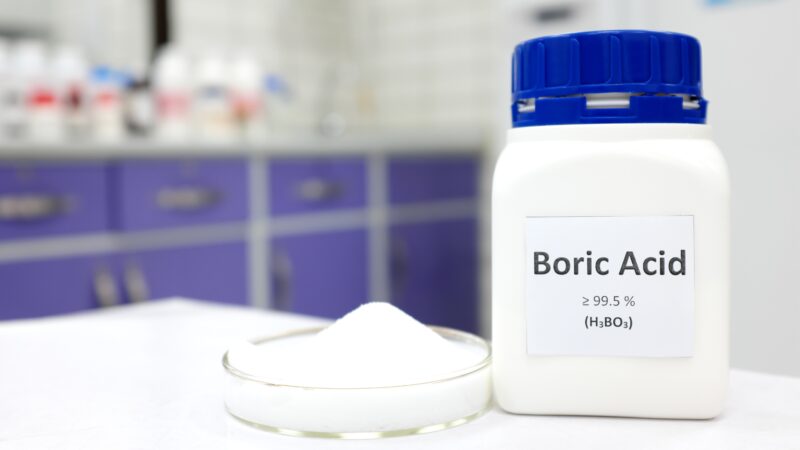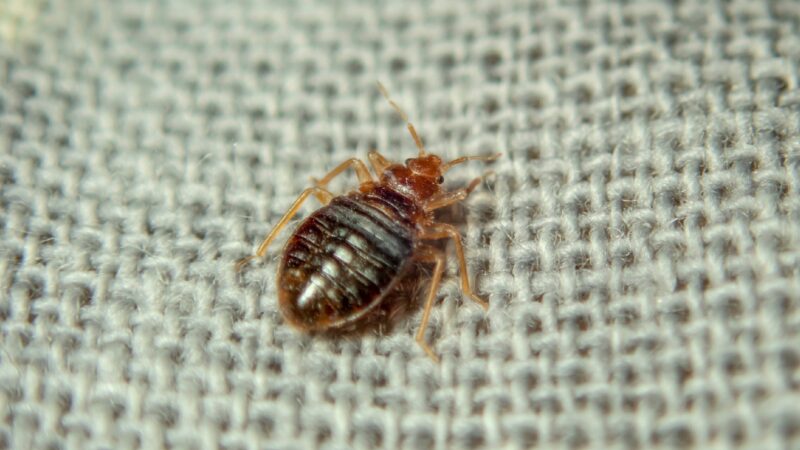You probably heard of the use of boric acid against some other pests, like cockroaches or ants. However, those pests are completely different when compared to bed bugs. You can create several mixes to lure those pests, like with sugar or honey. But that won’t work on bed bugs, because they feed exclusively on blood.
Does boric acid kill bed bugs? In theory, boric acid can kill bed bugs quite easily, because of its composition, but in reality, it is quite hard to use it against bed bugs. Why? Because you need a bait to lure bed bugs onto the boric acid as they need to eat the acid for it to take effect. Also, boric acid dust kills them as well, but only after a few days of exposure.
To find out if it is effective to combat bed bugs with boric acid, and how to do it if you decide to give it a try, stay with us till the end of this article. There are a lot of interesting facts about boric acid and the fight against bed bugs in general.
What Is Boric Acid?

Boric acid is a chemical used as a component in many insecticides. Its function is to give some extra killing power to the insecticide. It works on all pests in the same way. They need to eat it then it causes problems in their stomach and affects their nervous system.
Can Boric Acid Kill Bed Bugs?
The chances for boric acid to kill bed bugs are zero because they won’t eat it. They feed off human blood, and you can’t lure them using blood. If you spray the boric acid mixture on the places you want to protect, it will deter them to some extent. But even if bed bugs inhale boric acid, in most cases it won`t kill them (the death rate for dust is 33%).
From all of this, you can conclude that it won’t do any harm to the bed bug eggs either because boric acid is not working like some other pesticides by rubbing or spraying it on the target. It needs to be eaten and digested, and bed bug eggs can’t eat anything even if they wanted.
Boric Acid For Bed Bug Control: Is It Effective?

Boric acid can show some effect against bed bugs just in one way: by spraying it heavily on their common routes and hoping for the best. Even if they don’t eat it, they will inhale it. That can cause dehydration and suffocation of bed bugs.
If you want to use it in a conventional way, don’t even try, because like we said earlier, bed bugs need to eat the boric acid, and you can’t find a good lure for that to happen.
Boric acid can be used in combination with other methods and pesticides, but alone it can’t relieve you of bed bug menace. If you know the speed of their reproduction, you surely won’t waste time on some semi-effective solutions.
How To Use Boric Acid For Bed Bugs?
If you decide to give boric acid a try against bed bugs, there are a couple of ways for its use:
1. You can try to deter bed bugs from your bed by placing boric acid powder around the legs of your bed. Bed bugs will always search for a host to feed off, so they will go to your bed no matter what you do. If they go through the powder, in most cases they won’t die, but it won’t be a pleasure for them either.
2. You can make a liquid borax acid solution. That way, it is easier to apply the acid. The best way would be to spray the mattress and the carpet with a heavy load of boric acid.
After that, spray the mattress and the carpet with warm water. That way you create a suffocating layer of boric acid which is deadly for bed bugs. After inhaling it, it will kill some of the bed bugs.
The last step is to vacuum the surfaces treated with boric acid. That way you will definitely get rid of all bed bugs, that are either dead or unconscious.
3. The liquid borax acid solution can be applied around other furniture that you suspect to be infested with bed bugs. Just spray the acid in and around it, and after you give the acid time to react, you can finish the bed bugs by using a steam cleaner, or if you don’t have it, with a regular vacuum.
- Industrial grade strength
- 99.9+ percent pure
- Anhydrous (without water)
- High quality boric acid
- Powder form
Difference Between Boric Acid and Borax
Process of the production is different. Borax is mined from the ground, and boric acid is made from borax. To make boric acid, you need to put borax into the boiling water, and then add hydrochloric. When the mixture cools down, then starts the process of boric acid crystallization. During that process, boric acid crystals are filtered. You can make different mixtures of boric acid with purity levels adjusted to one’s needs.
The second big difference is in their form. Borax is mined from the ground, and it is rock formed. Boric acid, on the other side, is in the form of powder, because it is produced in crystals, and it never gets a chance to form a rock.
The problem with borax is that it can be toxic for humans because It causes eye irritation, and it can be harmful if swallowed. It is advised to keep any borax away from the reach of children.
Boric Acid vs. Borax vs. Diatomaceous Earth for Bed Bugs: What Is Better?
Diatomaceous earth comes in the form of powder, similar to borax. It is applied in the same way – you practically set traps for bed bugs or create safe zones free of bed bugs. You can cover some ground around your bed with it, and that should keep bed bugs away. You can also leave some of it on the surfaces you know they cross.
The effect of diatomaceous earth is also similar to one of borax. It causes damage to the exoskeleton after that dehydration happens, and finally death.
- Pure Original Ingredients Borax in a resealable bag
- Multipurpose cleaning agent
- DIY laundry soap, fabric softener & carpet freshener
- Always pure ingredients with no additives
Moreover, it is not recommended to use it as a sole instrument in the fight against bed bugs, because it is nearly impossible to get rid of all the bed bugs and their eggs by using it alone. It must be, like borax, combined with another pesticide if you want to stop a bed bug infestation.
So we can see that it is not so different to use borax or diatomaceous earth. What about boric acid? Boric acid is not recommended by us because its effect of it is really useless in the fight against bed bugs. Other methods are just better, while boric acid is amazing for other types of pests.
List of Sources
Boric Acid Kills Bed Bugs, But Only When They Eat It, Entomological Society of America.
Pesticides to Control Bed Bugs, EPA.
Bed Bug Treatments – IPM Florida, University of Florida.
- How to Get Rid of Copperheads | Practical Guide - August 27, 2023
- How to Get Rid of Corn Snakes | What Makes Them Aggressive? - August 27, 2023
- How to Get Rid of Alligators | Safety Measures and Removal Methods - July 16, 2023


